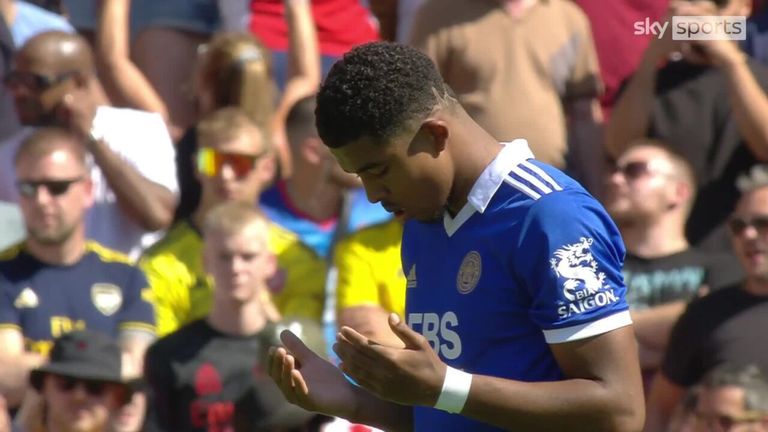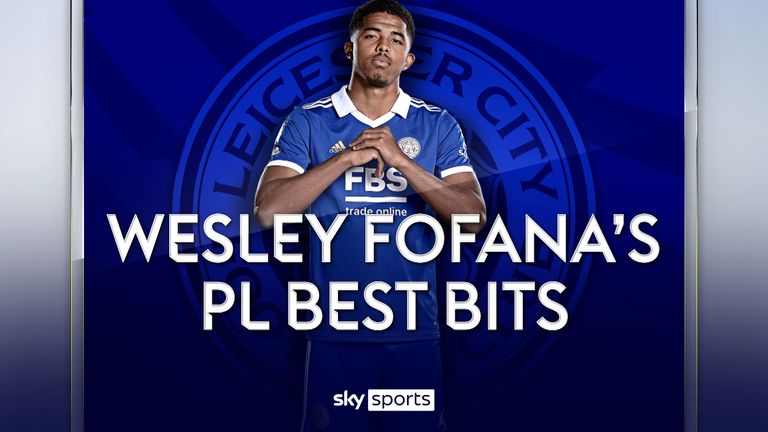
[ad_1]
Leicester were adamant that they would not sell Wesley Fofana for less than the £80m world-record fee paid for a defender, when Harry Maguire was sold to Manchester United in 2019.
Sky Sports News understands the final agreement with Chelsea is for £70m guaranteed cash, with a possible £5m in add-ons. So, what changed?
Crucially, Fofana was desperate to move to Stamford Bridge. And once he had made that clear to Brendan Rodgers, Leicester faced a dilemma: stick to their guns, and force an unhappy player to stay, with the focus on trying to re-integrate him back into the fold once the window had closed, or negotiate to get the best possible price they could for their biggest asset.
Leicester did not want to sell Fofana in this window. They had plans to keep him for another season at least, feeling that his experience and profile would only improve in that time, as would his asking price. But his desire to leave was key.
The player’s advisors were becoming increasingly frustrated with what they saw as Leicester pricing their man out of a career-changing move. The Fofana camp didn’t understand why their 21-year-old player was being given the same price tag as Maguire – who was sold as England’s first-choice centre-back, with years of Premier League and international experience – the finished article.
Leicester, for their part, were equally frustrated that Fofana had happily signed a two-year contract extension in March, taking his full deal to 2027, and was now demanding a move, just a few months later, even though Chelsea hadn’t matched Leicester’s asking price.
Chelsea, at this stage, negotiated very cleverly. Having come in with relatively low bids that they knew were unlikely to be accepted, they stayed quiet, and let the internal frustrations at Leicester play out.
Behind the scenes, Chelsea knew that personal terms would not be in issue. And the longer they waited, the more Fofana’s desire to leave would grow, and the more difficult it would be for Leicester to keep him and manage the situation.
Fofana missed a Leicester training session – not because he went on strike, but because his head had been turned, and he couldn’t give his best on the training pitch. Rodgers reacted in the only way he could – by taking him out of the firing line, and dropping him from the matchday squad for two games.
In the meantime, with new sporting director Martin Glover not yet in post, chief executive Susan Whelan took the lead in talks with Chelsea. Her priority was to get the best price she could with achievable add-ons – no point in being able to save face by saying it was an £80m fee, for example, if £10m of that fee was based on ambitious add-ons that Fofana was unlikely to reach.
And so a compromise was reached. Not the world-record fee that Leicester wanted, but a huge amount of money for a 21-year-old.
It’s important to point out that a significant proportion of that £70m is due to St Etienne who demanded a sell-on clause when they sold Fofana in 2020.
Add to that, the fact Leicester are facing inevitably huge cost-cutting measures to meet their upcoming Financial Fair Play obligations, and supporters are likely to be desperately disappointed in the short term at losing the biggest jewel in their crown, who is likely to be replaced by a player who will cost only a fraction of that £70m.
Leicester needed that money, and only around a third of it is likely to be re-invested in the playing squad. That is a worrying fact, with the team currently bottom of the Premier League.
As for Chelsea – there will be many supporters surprised by such a massive fee for a player who missed three-quarters of last season with a broken leg, and who has only made 37 Premier League appearances in total. Fofana has yet to win a senior cap for France, too.
But, as well as being an intelligent, speedy and physical defensive presence, Fofana is a very rare commodity in European football because of his ability on the ball. That’s what made him Thomas Tuchel’s number one transfer priority.
Tuchel believes Fofana will be absolutely key to the way he wants his Chelsea side to play: secure, but progressive in playing out from the back, with defenders who can read the game well, and are equally adept carrying the ball forward or spraying an array of passes. That is Fofana to a tee.
As one top coach explained to me, opposition players don’t know whether Fofana is going to hit a long or short pass, or whether he is going to spot a gap in the midfield and drive the ball forward himself. That will make it much more difficult for opponents to mount a defensive press against Chelsea and win the ball high up the field.
In the end, after a difficult and often fraught couple of months of negotiations, each of the three parties can walk away and feel they got a good deal.
Fofana is obviously delighted – he will play in the Champions League, compete for trophies, and line-up alongside Kalidou Koulibaly, who he has often said is one of his favourite defenders to watch.
Tuchel now has a key defensive cornerstone who can be a catalyst for the way he wants to play, and who will surely only improve in coming seasons.
And even Leicester – while licking their wounds at losing their biggest asset for less than they originally wanted – can be satisfied they weren’t bullied into selling cheap, and that they more than doubled their money for a player they’d bought a little more than 18 months ago.
Leicester’s toughest sell will be to convince their supporters that this sale was necessary, that there is a long-term plan to build, and that their ambition to compete at the top end of the Premier League remains strong, even in Fofana’s absence.
[ad_2]
Source link

